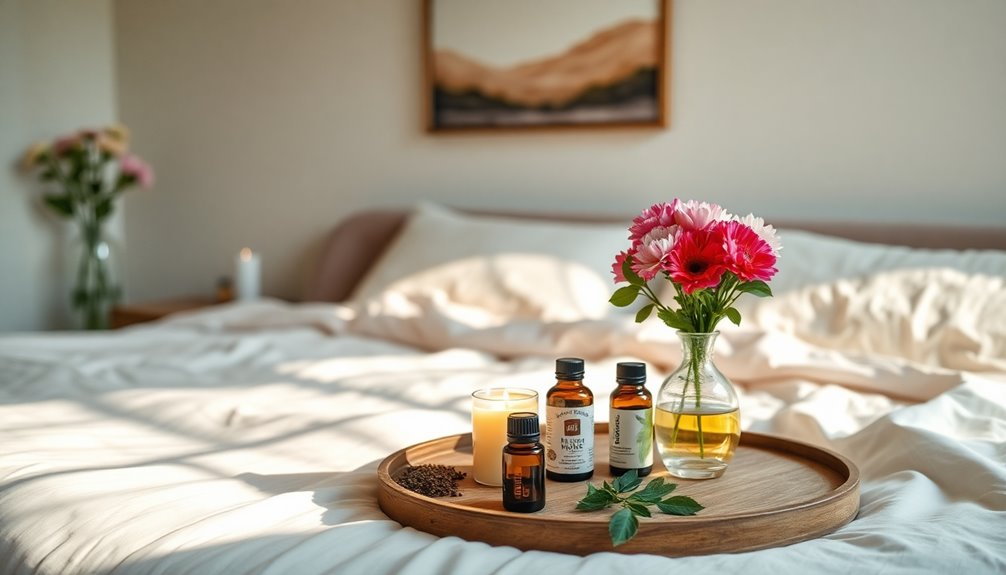If you're looking to boost your sex drive, start by understanding what's causing the decrease. Factors like hormone imbalances, stress, and certain medications can play a role. Consider making lifestyle changes, such as regular exercise, a balanced diet, and stress management techniques. Scheduled intimacy can also help strengthen your emotional connection with your partner. Don't hesitate to seek medical advice, as hormone therapy and counseling might be effective solutions. Exploring alternative remedies with your doctor can offer additional support. There's plenty more to discover about enhancing your libido, so keep exploring the options that work best for you.
Key Takeaways
- Consult a healthcare professional for a thorough evaluation to identify underlying hormonal or medical issues contributing to low libido.
- Consider hormone therapy or medications like Flibanserin to address hormonal imbalances and boost sexual desire.
- Implement lifestyle changes such as regular exercise, a balanced diet, and stress management techniques to enhance overall sexual health.
- Engage in open communication with your partner about intimacy issues and consider counseling to strengthen emotional connections.
- Explore alternative remedies, like herbal supplements, after consulting a doctor to ensure safety and minimize interaction risks.
Understanding Low Libido

Understanding low libido can feel overwhelming, but you're not alone. Many people experience a significant decrease in sexual desire, often leading to emotional dissatisfaction and relationship challenges.
Several causes of low libido can impact you, including hormonal imbalances and psychological factors like stress or depression. Medical conditions, such as diabetes and obesity, can also play a role, alongside certain medications that lower sexual desire.
Additionally, relationship dynamics, including conflicts and external stressors like work and parenting, can exacerbate the situation.
It's crucial to recognize that individual variations in libido are normal, influenced by factors such as age, health status, and lifestyle changes. By understanding these elements, you can begin to address your low libido effectively.
Common Causes of Low Sex Drive

Many factors can contribute to a low sex drive, and recognizing them is the first step toward finding solutions.
Low testosterone levels in men and estrogen fluctuations in women are common causes of low libido. Psychological factors like stress, anxiety, and depression can also diminish your sexual desire.
Additionally, medical conditions such as diabetes, obesity, and chronic illnesses are linked to decreased libido. Certain medications, especially antidepressants and blood pressure drugs, may have side effects that lower sexual desire.
Lifestyle factors, including excessive alcohol consumption, lack of physical activity, and poor diet, can negatively impact your sexual health.
If you suspect any of these issues, it's wise to consult a healthcare professional for guidance and support.
Symptoms and Diagnosis

If you've noticed a significant drop in your sexual desire, it might be time to recognize the symptoms of low libido. Common signs include reduced sexual fantasies, difficulty becoming or maintaining arousal, and emotional distress in relationships.
To achieve an accurate diagnosis, healthcare professionals typically conduct a thorough evaluation, including a detailed medical history and physical examination. They may also order blood tests to check hormone levels.
It's important to discuss your medication history, as some drugs, especially antidepressants and blood pressure medications, can impact sexual desire.
Additionally, healthcare providers will assess psychological factors like stress, anxiety, and depression, which can contribute to your symptoms. Understanding these elements is vital for identifying the underlying causes of low libido.
Effective Treatment Options

Addressing low libido requires a combination of effective treatment options tailored to your specific needs. Hormone therapy, like testosterone for men and estrogen for women, can help correct hormonal imbalances. Medications such as Flibanserin and Bremelanotide may boost sexual desires for pre-menopausal women. Lifestyle changes play an essential role—regular exercise, a balanced diet, and stress management can enhance your overall sexual health. Open communication with a health professional about medication side effects is important, as some drugs might lower libido. Additionally, fostering an emotional connection with your partner can reignite intimacy.
| Treatment Option | Benefits | Considerations |
|---|---|---|
| Hormone Therapy | Balances hormones | Not FDA-approved for all |
| Medications | Increases sexual desire | Varies per individual |
| Lifestyle Changes | Enhances overall health | Requires commitment |
| Counseling | Addresses psychological factors | May need a trained therapist |
The Role of Counseling

Counseling can be a game changer when it comes to improving your sex drive.
By fostering open communication, you can break down emotional barriers and strengthen your connection with your partner.
Together, you'll explore techniques that enhance intimacy and revive your sexual desires.
Importance of Open Communication
Open communication about sexual health and desires is essential for fostering intimacy and creating a supportive environment when dealing with low libido issues.
Here are three key benefits of open dialogue:
- Identifying Emotional Barriers: Discussing feelings can help uncover emotional barriers affecting your sexual satisfaction. Engaging in dynamic communication exercises can further enhance understanding between partners.
- Strengthening Relationships: Regular conversations about relationship issues enhance understanding and connection, making it easier to address low libido.
- Counseling Support: Working with a trained sex therapist can guide these discussions, ensuring both partners feel heard and valued.
Additionally, understanding narcissistic behaviors can provide insight into how emotional abuse may impact intimacy and sexual health.
Encouraging open communication reduces stigma surrounding libido concerns, paving the way for healthier attitudes and a more satisfying sexual relationship.
Techniques for Emotional Connection
When struggling with low libido, exploring emotional connections can be transformative, and working with a trained sex therapist often proves invaluable.
Therapy sessions focus on uncovering emotional barriers that may hinder your sexual desire and intimacy. Through open discussions about communication issues, you'll develop a deeper understanding of your relationship dynamics.
Couples counseling creates a safe space to address frustrations related to low libido, ultimately strengthening your emotional bond.
Additionally, therapists introduce therapeutic exercises that enhance both emotional connection and sexual response. By engaging in these practices, you can revive intimacy and improve your overall sexual interest over time.
With the right support, you'll find a renewed sense of closeness and desire.
Hormone Therapy Considerations

When it comes to boosting your sex drive, identifying hormonal imbalances is essential.
You have several treatment options available, each with its own risks and benefits.
Understanding these can help you make informed decisions about your sexual health.
Hormonal Imbalance Identification
Identifying hormonal imbalances is essential if you're struggling with a low sex drive, as these imbalances can profoundly impact your libido.
Here's how to start:
- Get Blood Tests: Evaluating hormone levels, including low testosterone and estrogen fluctuations, is vital for diagnosing imbalances.
- Consider Symptoms: Be aware of conditions like genitourinary syndrome of menopause (GSM), which can negatively affect your sexual comfort and desire.
- Discuss Options: Talk to your doctor about testosterone therapy, even if it's off-label for women, while monitoring for potential side effects.
Treatment Options Overview
Exploring treatment options for low libido can lead you to effective hormone therapies that may restore your sexual desire.
For women, estrogen treatments can alleviate menopausal symptoms, while men often benefit from testosterone replacement therapy to address low testosterone levels.
If you're experiencing vaginal dryness or painful sex, medications like Prasterone and Ospemifene might help.
Hormonal imbalances can be assessed through blood tests, enabling your healthcare provider to create an individualized treatment plan tailored to your needs.
It's essential to monitor potential side effects throughout your treatment, as adjustments may be necessary to optimize results and guarantee your safety.
Taking these steps can set you on the right path to regaining your sexual desire and overall well-being.
Risks and Benefits
While hormone therapy can significantly enhance your libido by addressing underlying hormonal imbalances, it's crucial to weigh the associated risks and benefits carefully.
Consider these key points:
- Estrogen Therapy Risks: Long-term use can lead to blood clots and certain cancers, especially in women.
- Low Testosterone Considerations: Testosterone therapy is often discussed for women with low libido, even if not FDA-approved, necessitating informed choices about risks versus benefits.
- Medications like Flibanserin and Bremelanotide: These can target women's sexual desire but may have varying effectiveness and side effects.
Always create personalized treatment plans and regularly monitor hormone levels to minimize risks and optimize benefits.
Open discussions with your healthcare provider can guarantee your therapy aligns with your needs and health goals.
Lifestyle Changes to Boost Libido

If you want to reignite your libido, making some lifestyle changes can make a significant difference.
Start by incorporating regular exercise and strength training; these activities boost overall body image and enhance circulation. Pair this with a balanced diet rich in vegetables, lean proteins, and zinc-containing foods to support sexual health.
Prioritizing quality sleep is essential too, as better rest correlates with increased sexual desire. Additionally, embrace stress management techniques like meditation and yoga to alleviate anxiety and improve emotional well-being. Incorporating relaxation before sleep can also enhance your ability to manifest a healthy sex drive.
Finally, don't forget to set aside time for intimacy—plan date nights or engage in affectionate activities to strengthen your emotional connection.
Together, these healthy lifestyle changes can greatly boost your libido.
Alternative Remedies and Support

Alternative remedies can offer a natural approach to boosting your sex drive. Consider these options:
- Herbal Supplements: Try maca, ginseng, or ginkgo biloba, but consult your doctor first to avoid any medication interactions.
- Physical Activity: Regular exercise not only enhances your body image but is also linked to increased sexual desire.
- Stress Reduction: Engage in mindfulness meditation or relaxation exercises to ease anxiety and improve your libido.
Additionally, fostering an emotional connection through open communication with your partner can enhance intimacy.
Don't hesitate to consult a sex therapist for personalized strategies to address any emotional barriers affecting your desire.
These alternative remedies and support methods can lead to a more fulfilling sex life.
Preparing for Doctor Appointments

How can you make the most of your doctor's appointment when addressing low libido? Start by compiling a list of symptoms, including their duration and any emotional distress. Prepare your medical history, noting past surgeries, hormonal treatments, and current medications. Also, consider lifestyle factors affecting your sex drive, like stress levels, diet, and exercise. Write down specific questions to guarantee you cover all relevant topics.
Here's a helpful table to guide your preparation:
| Aspect | Details to Include | Importance |
|---|---|---|
| Symptoms | Duration, emotional impact | Helps provider understand issues |
| Medical History | Past treatments, current medications | Identifies possible causes |
| Lifestyle Factors | Stress, diet, exercise, substance use | Informs treatment recommendations |
| Questions | Concerns about relationship dynamics | Facilitates open communication |
Consider bringing a partner to discuss intimacy issues.
Frequently Asked Questions
Is It Possible to Regain Your Sex Drive?
Yes, it's definitely possible to regain your sex drive.
You can start by addressing any underlying medical or psychological issues that might be affecting you. Consider making lifestyle changes, like exercising regularly and managing stress, which can boost your overall well-being.
Open communication with your partner about your needs can also enhance intimacy.
If needed, seeking help from a therapist can provide strategies to navigate emotional challenges, helping you reconnect with your desires.
How Do I Bring My Sex Drive Back?
Bringing your sex drive back can feel like trying to resurrect a dinosaur—daunting, but not impossible!
Start by moving your body; exercise isn't just for fitness; it supercharges your libido!
Open up to your partner about your desires; communication can ignite passions.
Don't forget to manage stress—think meditation or journaling.
And, of course, fuel your body with nutritious foods to support hormonal balance.
Take these steps, and you'll feel the spark return!
Why Don't I Want Sex Anymore?
If you're wondering why you don't want sex anymore, it could be due to various factors.
Hormonal changes might be affecting your desire, or stress and anxiety could be taking a toll on your mood.
Relationship dynamics also play a significant role—conflicts or disconnection can dampen intimacy.
Don't forget about lifestyle choices; poor diet, lack of exercise, or excessive drinking can impact your libido too.
It's important to explore these areas for clarity.
Can Sex Drive Be Recovered?
Absolutely, you can recover your sex drive!
While it might feel like a distant memory now, simple lifestyle changes can reignite that spark. Imagine swapping lazy evenings for active outings, or indulging in nourishing foods that fuel your body.
You'll find that addressing emotional barriers and seeking support can also help. Whether it's through therapy or adjusting medications, taking these steps can lead you back to a fulfilling intimate life you deserve.
Conclusion
Regaining your sex drive is like nurturing a garden; with patience and care, it can flourish once more. By understanding the roots of low libido and exploring treatment options, you can cultivate a vibrant and fulfilling intimacy. Embrace lifestyle changes and consider counseling as tools to help you reconnect with your desires. Remember, every journey is unique, so don't hesitate to seek support. With dedication, you'll find the spark that ignites your passion again.










